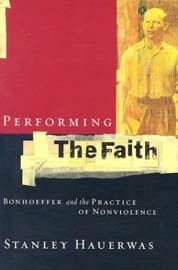Performing the Faith

Time magazine has called Stanley Hauerwas “America’s Best Theologian.” This is like the Chaucer Review giving Gabriel García Márquez an award for Best Sci-Fi Novelist, but Hauerwas deserves the attention—especially because his critics continue to denounce him as a foul-mouthed loose cannon prone to indefensible sound bites. How can he seriously attack the idea of democracy, as he apparently does, or defend a militantly nonviolent reading of Christian ethics in the face of 9/11? And why won’t he stay put, intellectually—coming on like a postmodernist one minute, attacking relativism the next; defending gay Catholics while rejecting the sexual revolution; condemning war while attacking “liberalism”? But readers who struggle through their initial puzzlement often find Hauerwas an indispensable guide to the unstated assumptions binding modern liberals and conservatives together.
-

-

-

-

-

-

-

-

-

-

-

-

-

-

-

-

-

-

-

-

-

-

-

-

-

-

-

-

-

-

-

-

-

-

-

-

-

-

-

-








































